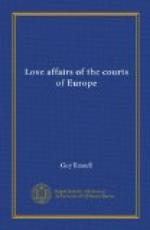The picture drawn by the Margravine of Baireuth is still less attractive: “She was short and huddled up, much tanned, and utterly devoid of dignity or grace. Muffled up in her clothes, she looked like a German comedy-actress. Her old-fashioned gown, heavily embroidered with silver, and covered with dirt, had been bought in some old-clothes shop. The front of her skirt was adorned with jewels, and she had a dozen orders and as many portraits of saints fastened all along the facings of her dress, so that when she walked she jingled like a mule.”
But in the eyes of one man at least—and he the greatest in all Russia—she was beautiful. His allegiance never wavered, nor indeed did that of his army, which idolised her to a man. She might have no boudoir graces, but at least she was the typical soldier’s wife, and cut a brave figure, as she reviewed the troops or rode at their head in her uniform and grenadier cap. She shared all the hardships and dangers of campaigns with a smile on her lips, sleeping on the hard ground, and standing in the trenches with the bullets whistling about her ears, and men dropping to right and left of her.
Nor was there ever a trace of vanity in her. She was as proud of her humble origin as if she had been cradled in a palace. To princes and ambassadors she would talk freely of the days when she was a household drudge, and loved to remind her husband of the time when his Empress used to wash shirts for his favourite. “Though, no doubt, you have other laundresses about you,” she wrote to him once, “the old one never forgets you.”
The letters that passed between this oddly assorted couple, if couched in terms which could scarcely see print in our more restrained age, are eloquent of affection and devotion. To Peter his kitchen-Queen was “friend of my Heart,” “dearest Heart,” and “dear little Mother.” He complains pathetically, when away with his army, “I am dull without you—and there is nobody to take care of my shirts.” When Catherine once left him on a round of visits, he grew so impatient at her absence that he sent a yacht to bring her back, and with it a note: “When I go into my rooms and find them deserted, I feel as if I must rush away at once. It is all so empty without thee.”
And each letter is accompanied by a present—now a watch, now some costly lace, and again a lock of his hair, or a simple bunch of dried flowers, while she returns some such homely gift as a little fruit or a fur-lined waistcoat. On both sides, too, a vein of jocularity runs through the letters, as when Catherine addresses him as “Your Excellency, the very illustrious and eminent Prince-General and Knight of the crowned Compass and Axe”; and when Peter, after the Peace of Nystadt, writes: “According to the Treaty I am obliged to return all Livonian prisoners to the King of Sweden. What is to become of thee, I don’t know.” To which she answers, with true wifely (if affected) humility: “I am your servant; do with me as you will; yet I venture to think you won’t send me back.”




